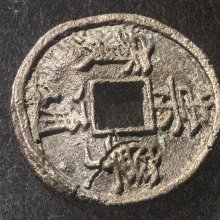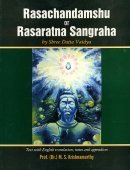Varta, Vārtā, Vārta: 18 definitions
Introduction:
Varta means something in Hinduism, Sanskrit, the history of ancient India, Marathi, Hindi, biology. If you want to know the exact meaning, history, etymology or English translation of this term then check out the descriptions on this page. Add your comment or reference to a book if you want to contribute to this summary article.
Images (photo gallery)
In Hinduism
Dharmashastra (religious law)
Source: Wisdom Library: Dharma-śāstraVārtā (वार्ता) refers to “trade-agriculture”. It represents a branch of knowledge, dealing with the acquiring and spending of wealth, of which the King should be familiar with. The word is used throughout Dharmaśāstra literature such as the Manusmṛti. (also see the Manubhāṣya verse 7.43)
Source: Knowledge Traditions & Practices of India: Education: Systems & PracticesVārtā (वार्ता, “agriculture”) refers to “animal husbandry” and “trade and commerce” and represents one of the nine divisions of the Paurūṣeya classification of Śāstra knowledge; all part of the ancient Indian education system, which aimed at both the inner and the outer dimension of a person.

Dharmashastra (धर्मशास्त्र, dharmaśāstra) contains the instructions (shastra) regarding religious conduct of livelihood (dharma), ceremonies, jurisprudence (study of law) and more. It is categorized as smriti, an important and authoritative selection of books dealing with the Hindu lifestyle.
Purana and Itihasa (epic history)
Source: archive.org: Puranic EncyclopediaVārta (वार्त).—A King of ancient India. This King stays in the palace of Yama praising and worshipping him. (Mahābhārata Sabhā Parva, Chapter 8, Stanza 10).
Source: Cologne Digital Sanskrit Dictionaries: The Purana IndexVārtā (वार्ता).—Produced by Brahmā; according to Prahlāda, should be a means to realise Hari; profession of Vaiśyas. Fourfold—kṛṣi, vāṇijyam, go-rakṣa, and kusīda (usury).1 Began in the Tretāyuga and disappears towards the close of the Kali; not known in Puṣkaradvīpa.2 Origin of commerce; came into being after the beginning of the Tretāyuga when the grāmāraṇya corns were not enough and when people wanted something more to live on; with vārtā came maryādā and conventions of society;3 symbolical of Devī;4 a vidyā.5
- 1) Bhāgavata-purāṇa III. 12. 44; VII. 6. 26; 11. 16; X. 24. 21. Brahmāṇḍa-purāṇa I. 1. 92; Vāyu-purāṇa 49. 117; 57. 89; 58. 25; 59. 36; 61. 160 and 166.
- 2) Brahmāṇḍa-purāṇa II. 19. 121. 30. 3 and 8; 32. 40; 35. 187 and 195; III. 74. 210-2. Viṣṇu-purāṇa II. 4. 83.
- 3) Vāyu-purāṇa 8. 159, 202; Brahmāṇḍa-purāṇa II. 7. 151. Viṣṇu-purāṇa I. 6. 20 and 22.
- 4) Ib. I. 9. 121.
- 5) Ib. V. 10. 27-28.

The Purana (पुराण, purāṇas) refers to Sanskrit literature preserving ancient India’s vast cultural history, including historical legends, religious ceremonies, various arts and sciences. The eighteen mahapuranas total over 400,000 shlokas (metrical couplets) and date to at least several centuries BCE.
Vyakarana (Sanskrit grammar)
Source: Wikisource: A dictionary of Sanskrit grammarVarta (वर्त).—A term used by ancient grammarians and later on by commentators for compound words; cf. वर्तनं वर्तः समासः (vartanaṃ vartaḥ samāsaḥ) Nyasa on Kas. II.4.15.
--- OR ---
Vārta (वार्त).—Of no use; serving no purpose; the word is possibly derived from वार्ता (vārtā) (लेकवाती (lekavātī)) meaning people's gossip; cf एतच्च वार्तम् (etacca vārtam) M.Bh.on P.I.2. 64 Vart. 25; also on P. II.2.24, II. 4.13 etc.

Vyakarana (व्याकरण, vyākaraṇa) refers to Sanskrit grammar and represents one of the six additional sciences (vedanga) to be studied along with the Vedas. Vyakarana concerns itself with the rules of Sanskrit grammar and linguistic analysis in order to establish the correct context of words and sentences.
Arthashastra (politics and welfare)
Source: Knowledge Traditions & Practices of India: Society State and Polity: A SurveyVārta (वार्त, “economics”) refers to one of the four classes of knowledge needed to run a state according to Kauṭilya’s Arthaśāstra (4th century BCE): one of the most influential treatises of political science. Vārta refers to economics, specifically agriculture, cattle breeding, and trade.

Arthashastra (अर्थशास्त्र, arthaśāstra) literature concerns itself with the teachings (shastra) of economic prosperity (artha) statecraft, politics and military tactics. The term arthashastra refers to both the name of these scientific teachings, as well as the name of a Sanskrit work included in such literature. This book was written (3rd century BCE) by by Kautilya, who flourished in the 4th century BCE.
Ayurveda (science of life)
Kalpa (Formulas, Drug prescriptions and other Medicinal preparations)
Source: Shodhganga: Edition translation and critical study of yogasarasamgrahaVārtā (वार्ता) refers to the medicinal plant known as “Solanum menongenia Linn.” and is dealt with in the 15th-century Yogasārasaṅgraha (Yogasara-saṅgraha) by Vāsudeva: an unpublished Keralite work representing an Ayurvedic compendium of medicinal recipes. The Yogasārasaṃgraha [mentioning vārtā] deals with entire recipes in the route of administration, and thus deals with the knowledge of pharmacy (bhaiṣajya-kalpanā) which is a branch of pharmacology (dravyaguṇa).

Āyurveda (आयुर्वेद, ayurveda) is a branch of Indian science dealing with medicine, herbalism, taxology, anatomy, surgery, alchemy and related topics. Traditional practice of Āyurveda in ancient India dates back to at least the first millenium BC. Literature is commonly written in Sanskrit using various poetic metres.
Jyotisha (astronomy and astrology)
Source: Wisdom Library: Brihat Samhita by VarahamihiraVārta (वार्त) or Vārtta refers to “dealers” (of flowers, roots, fruits, seeds, etc.), according to the Bṛhatsaṃhitā (chapter 15) (“On the nakṣatras—‘asterisms’”), an encyclopedic Sanskrit work written by Varāhamihira mainly focusing on the science of ancient Indian astronomy astronomy (Jyotiṣa).—Accordingly, “Those who are born on the lunar day of Mūla will be druggists, heads of men, dealers (vārta) in flowers, roots, fruits and seeds; will be rich and will delight in garden work. Those who are born on the lunar day of Pūrvāṣāḍha will be of gentle manners; fond of sea-voyage, truthful, cleanly and wealthy; will delight in earth work; will be boatmen; will be dealers in fruits and flowers of water. [...]”.

Jyotisha (ज्योतिष, jyotiṣa or jyotish) refers to ‘astronomy’ or “Vedic astrology” and represents the fifth of the six Vedangas (additional sciences to be studied along with the Vedas). Jyotisha concerns itself with the study and prediction of the movements of celestial bodies, in order to calculate the auspicious time for rituals and ceremonies.
India history and geography
Source: Cologne Digital Sanskrit Dictionaries: Indian Epigraphical GlossaryVārta.—(CII 4; IA 14), same as Vṛtti-bhuj, ‘one who enjoys a grant or the share of a grant’; a person in possession of a vṛtti. Note: vārta is defined in the “Indian epigraphical glossary” as it can be found on ancient inscriptions commonly written in Sanskrit, Prakrit or Dravidian languages.
See also (synonyms): Vartta.

The history of India traces the identification of countries, villages, towns and other regions of India, as well as mythology, zoology, royal dynasties, rulers, tribes, local festivities and traditions and regional languages. Ancient India enjoyed religious freedom and encourages the path of Dharma, a concept common to Buddhism, Hinduism, and Jainism.
Biology (plants and animals)
Source: Google Books: CRC World Dictionary (Regional names)Varta in India is the name of a plant defined with Solanum melongena in various botanical sources. This page contains potential references in Ayurveda, modern medicine, and other folk traditions or local practices It has the synonym Solanum melongena var. depressum Linnaeus (among others).
Example references for further research on medicinal uses or toxicity (see latin names for full list):
· Kew Bulletin (1985)
· Flora URSS (1955)
· Indian Journal of Genetics and Plant Breeding (1981)
· Histoire Naturelle, Médicale et Économique des Solanum (1813)
· Field Museum of Natural History, Botanical Series (1962)
· Bulletin of the Botanical Survey of India (1969)
If you are looking for specific details regarding Varta, for example side effects, diet and recipes, extract dosage, pregnancy safety, chemical composition, health benefits, have a look at these references.

This sections includes definitions from the five kingdoms of living things: Animals, Plants, Fungi, Protists and Monera. It will include both the official binomial nomenclature (scientific names usually in Latin) as well as regional spellings and variants.
Languages of India and abroad
Marathi-English dictionary
Source: DDSA: The Aryabhusan school dictionary, Marathi-Englishvārtā (वार्ता).—f Tidings. Rumour. Conversation. vārtāhī nasaṇēṃ To exist not even in name.
Marathi is an Indo-European language having over 70 million native speakers people in (predominantly) Maharashtra India. Marathi, like many other Indo-Aryan languages, evolved from early forms of Prakrit, which itself is a subset of Sanskrit, one of the most ancient languages of the world.
Sanskrit dictionary
Source: DDSA: The practical Sanskrit-English dictionaryVarta (वर्त).—(Usually at the end of comp.) Living, livelihood; as in कल्यवर्त (kalyavarta) q. v.
Derivable forms: vartaḥ (वर्तः).
Source: Cologne Digital Sanskrit Dictionaries: Edgerton Buddhist Hybrid Sanskrit DictionaryVarta (वर्त).—(m. or nt.; = Pali vaṭṭa, usually derived from Sanskrit vṛtta, which is not known in this sense; if this is true, varta shows false Sanskritization), round of existences (= saṃ- sāra): varte (so mss., Senart em. vatte, which is not noted in this sense in MIndic) apratima dharmadarśanam… Mahāvastu i.63.17 (verse), in the round of existences matchless is the revelation of the Law.
Source: Cologne Digital Sanskrit Dictionaries: Monier-Williams Sanskrit-English Dictionary1) Varta (वर्त):—a m. ([from] √vṛt) subsistence, livelihood, [cf. Lexicographers, esp. such as amarasiṃha, halāyudha, hemacandra, etc.] (mostly ifc.; See andhaka-, kalya-, bahu-, brahma-v)
2) the urethra, [Kauśika-sūtra [Scholiast or Commentator]] ([varia lectio] for 1. varti).
3) [from vṛt] b etc. See p. 925, col. 2.
Source: DDSA: Paia-sadda-mahannavo; a comprehensive Prakrit Hindi dictionary (S)Varta (वर्त) in the Sanskrit language is related to the Prakrit words: Vaṭṭa, Vaṭṭāva.
[Sanskrit to German]
Sanskrit, also spelled संस्कृतम् (saṃskṛtam), is an ancient language of India commonly seen as the grandmother of the Indo-European language family (even English!). Closely allied with Prakrit and Pali, Sanskrit is more exhaustive in both grammar and terms and has the most extensive collection of literature in the world, greatly surpassing its sister-languages Greek and Latin.
Hindi dictionary
Source: DDSA: A practical Hindi-English dictionaryVārtā (वार्ता):—(nf) a talk; talks, negotiation; ~[kāra] a talker; negotiator; ~[vaha/hara] a messenger, courier; ~[raṃbha] commencement of talks/negotiation.
...
Kannada-English dictionary
Source: Alar: Kannada-English corpusVārta (ವಾರ್ತ):—
1) [adjective] being in a good condition; healthy.
2) [adjective] ordinary; mediocre; meddling.
3) [adjective] worethless; vain.
--- OR ---
Vārta (ವಾರ್ತ):—
1) [noun] the state of being well; healthy state; welfare.
2) [noun] a useless, worthles thing.
3) [noun] petty-mindedness; meanness.
4) [noun] news; information.
5) [noun] Vedic custom or way of life.
6) [noun] skill; dexterity; craft; talent.
7) [noun] a healthy man.
8) [noun] a man pursuing a particular profession; a professional.
Kannada is a Dravidian language (as opposed to the Indo-European language family) mainly spoken in the southwestern region of India.
See also (Relevant definitions)
Starts with (+53): Varta-anukarshaka, Vartabhara, Vartacara, Vartaghni, Vartahara, Vartailakhe, Vartajanman, Vartaka, Vartakadharma, Vartakadi, Vartakah, Vartakaja, Vartakanave, Vartakatana, Vartaki, Vartakin, Vartakini, Vartaku, Vartal, Vartala.
Ends with (+212): Abhinivarta, Abhiparyavarta, Abhiramavarta, Abhivarta, Abhyavarta, Acakravarta, Achintyaparivarta, Acintyaparivarta, Agamavarta, Agananiyaparivarta, Aganeyaparivarta, Agnivarta, Alavarta, Amapyaparivarta, Ameyaparivarta, Amravarta, Anabhilapyanabhilapyaparivarta, Anabhilapyaparivarta, Anantavarta, Anavarta.
Full-text (+221): Andhakavarta, Shikhara-varta, Vatta, Vartas, Shikhar-vaarta, Samayik-vaarta, Vartta, Samvartam, Parivartam, Vartajanman, Bahuvarta, Kramavattu, Karavartam, Varta-anukarshaka, Varti, Abhyavartam, Samvartamaruttiya, Hastavartam, Samvartakalpa, Abhinivartam.
Relevant text
Search found 53 books and stories containing Varta, Vārtā, Vārta, Vaarta; (plurals include: Vartas, Vārtās, Vārtas, Vaartas). You can also click to the full overview containing English textual excerpts. Below are direct links for the most relevant articles:
Rig Veda (translation and commentary) (by H. H. Wilson)
Garga Samhita (English) (by Danavir Goswami)
Verse 5.9.46 < [Chapter 9 - The Happiness of the Yadus]
Verse 6.8.25 < [Chapter 8 - The Marriages of All the Queens]
Verse 4.11.17 < [Chapter 11 - The Story of the Gopīs that were Residents of...]
Kavyamimamsa of Rajasekhara (Study) (by Debabrata Barai)
Part 3 - Synthesis of Rīti, Vṛtti and Pravṛitti < [Chapter 3 - Contribution of Rājaśekhara to Sanskrit Poetics]
Part 1 - Rājaśekhara Contribution on Śāstriya Vimarṣa (poetical science) < [Chapter 3 - Contribution of Rājaśekhara to Sanskrit Poetics]
Part 1.1 - Discipline, nature and divisions of Sāhitya-vidyā (poetics) < [Chapter 5 - Analyasis and Interpretations of the Kāvyamīmāṃsā]
Brihad Bhagavatamrita (commentary) (by Śrī Śrīmad Bhaktivedānta Nārāyana Gosvāmī Mahārāja)
Verse 2.4.257 < [Chapter 4 - Vaikuṇṭha (the spiritual world)]
Verse 1.6.31-32 < [Chapter 6 - Priyatama (the most beloved devotees)]
Verse 2.2.10 < [Chapter 2 - Jñāna (knowledge)]
Folk Tales of Gujarat (and Jhaverchand Meghani) (by Vandana P. Soni)
Doshi Ma Nee Vato < [Part 4 - Dadajee Ni Vato]
Chapter 13 - Vanadiya Ni Varta < [Part 3 - Kankavati]
Rasa Jala Nidhi, vol 3: Metals, Gems and other substances (by Bhudeb Mookerjee)
Part 1 - Characteristics of Varta-loha < [Chapter X - Mixed metals (3): Varta-loha]
Part 2 - Purification and Incineration of Varta-loha < [Chapter X - Mixed metals (3): Varta-loha]
Related products


